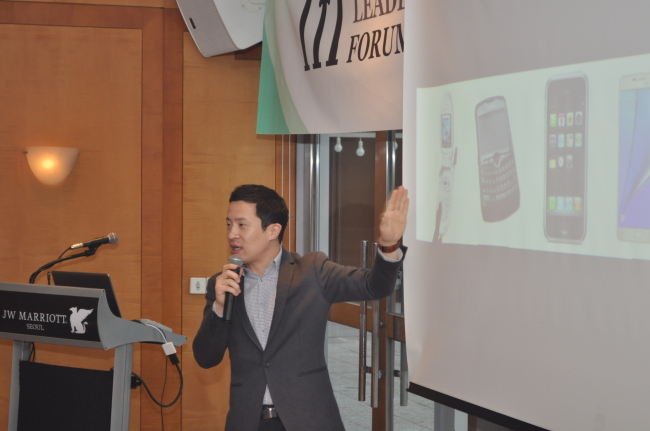Media technology -- whether hardware or software -- has further boosted the value of content, not made it worthless or led to the disappearance of conventional broadcasting networks.

However, the media industry must be able to quickly “catch and read” the latest technology and consumption trends in order to stay ahead of the game, according to Mickey Kim, head of Asia-Pacific for Google’s Chromecast & TV. Those who fail to respond and take action -- like the now-defunct Blockbuster, a home movie and video rental company -- will fall behind and disappear. Those who successfully embrace new technology, like Netflix, will flourish.
“I can’t understand how some people still wonder why people no longer read newspapers on subways. It’s 2015. We are living in an era where people are able to multitask, like sending text messages via social networks on their smartphones while watching multiscreen TV,” Kim said at the Media Leaders Forum in Seoul on Tuesday.
He noted that 84 percent of people do something else while watching TV, like sharing content or searching on their smartphones or tablet PCs.
This media-multitasking behavior has become the norm, yet is still viewed as unconventional by some. The media industry has to realize that consumers are in control of what they prefer or like when it comes to content, he argued.
Internet technologies have also enabled producers to create content customized to people’s preferences, like Netflix’s hit political drama “House of Cards,” which was made after analyzing data from its customers.
“What we are doing is ‘communicating’ (with TV and content). Has this changed consumers’ behavior, made content less valuable? Absolutely not. The Internet and big data analytics have spurred the value creation of content.”
Kim spoke at the forum hosted by the Media & Future Institute under the theme of “TV and media ecosystem in the mobile-first world” to discuss the changing media landscape with media economists, business executives and regulators.
He noted that mobile video consumption had overtaken that of traditional TV as of the second quarter of this year, indicating that people are enjoying content more on smart devices than on TVs.
However, according to Kim, content on big-screen TVs offers more immersive experiences compared to smartphones, on which consumers, for instance, spend an average of just six minutes watching YouTube per session, equivalent to two short music videos.
“People will become more immersed (in the experience) by bigger and brighter screens,” Kim said, adding that the industry will see more TVs connected with mobile devices to satisfy consumers’ diverse content needs in the “mobile-first” era.
(hkp@heraldcorp.com)





![[From the Scene] Monks, Buddhists hail return of remains of Buddhas](http://res.heraldm.com/phpwas/restmb_idxmake.php?idx=644&simg=/content/image/2024/04/19/20240419050617_0.jpg&u=20240419175937)





![[Graphic News] French bulldog most popular breed in US, Maltese most popular in Korea](http://res.heraldm.com/phpwas/restmb_idxmake.php?idx=644&simg=/content/image/2024/04/18/20240418050864_0.gif&u=)


![[From the Scene] Monks, Buddhists hail return of remains of Buddhas](http://res.heraldm.com/phpwas/restmb_idxmake.php?idx=652&simg=/content/image/2024/04/19/20240419050617_0.jpg&u=20240419175937)

![[KH Explains] Hyundai's full hybrid edge to pay off amid slow transition to pure EVs](http://res.heraldm.com/phpwas/restmb_idxmake.php?idx=652&simg=/content/image/2024/04/18/20240418050645_0.jpg&u=20240419100350)

![[Today’s K-pop] Illit drops debut single remix](http://res.heraldm.com/phpwas/restmb_idxmake.php?idx=642&simg=/content/image/2024/04/19/20240419050612_0.jpg&u=)